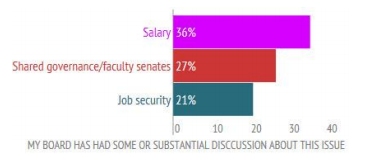You have /5 articles left.
Sign up for a free account or log in.
It’s been called higher education’s “dirty little secret": that adjunct faculty members now make up the majority of the teaching force but still face low per-course pay and poor working conditions compared to their tenure-line colleagues. But the secret has been getting out, with even mainstream media outlets picking up on the trend. Congress also has taken note, releasing a report this year called “The Just-In-Time Professor” about the lives of adjunct faculty.
Despite all that, one group of higher education players still isn’t paying all that much attention to issues surrounding adjunct employment, according to the results of a recent survey from the Association of Governing Boards: trustees.
“Adjunct faculty, both full- and part-time, play important roles in our nation’s campuses,” the AGB Quick Governance Survey on adjunct faculty report says. “The numbers have increased dramatically, calling increased attention to their employment arrangements and working conditions. As a result, new discussions are emerging about the role and status of these employees, and their collective bargaining efforts.”
And yet, AGB concludes that “even among institutions with collective bargaining agreements [with adjunct faculty], the range and depth of discussions about many of these issues is limited.”
About two-thirds of respondents to the AGB survey have not discussed issues related to adjunct faculty employment status, including compensation, voice in governance, or job security.
Robert O’Neill, former president of the University of Virginia and a special assistant to the president of AGB, helped design the survey. In an interview, he said he was “struck” by that finding, but that it illustrates the “general indifference of most institutions and their boards, and, I have to say, administrators, toward adjuncts.”
O’Neill said it appeared boards are ignoring the “invisible elephant in the room” until they no longer can – “until somebody walks into an office or board room with a box of [union] cards.”
When boards do discuss adjunct issues, they focus on pay. Some 36 percent of survey respondents who said their boards have discussed adjuncts said talk centered on adjunct pay, while 27 percent said they’ve had some or substantial discussion about the status of adjuncts regarding shared governance and participation in faculty senates.

Job security is the least-discussed of all topics related to adjuncts, with 21 percent of respondents whose boards have discussed adjunct employment touching on that subject.
The survey also asked questions about adjunct unions. More than three-quarters of respondents – 77 percent – said their institutions don’t have and aren’t considering collective bargaining with their adjuncts. Ten percent of all respondents have a collective bargaining agreement, while the rest are considering collective bargaining or don’t know the status of the collective bargaining among adjuncts at their institutions.
Those results look different by institution type, with private colleges and universities much more likely to say they don’t have and aren’t considering collective bargaining (82 percent) than respondents from public institutions (56 percent).
Of the institutions that have adjunct unions, 71 percent said that labor unions approached their faculty (rather than the other way around).
It seems that adjunct unions on campus have some, but not much, impact on board room discussions about adjunct employment. Among those whose institutions do not have collective bargaining agreements with their adjunct faculty, 82 percent said their governing board has had very little to no discussion of adjunct job security. Some 63 percent said the same for adjunct pay.
For respondents whose institutions have collective bargaining with adjuncts, 58 percent said their governing boards have had little to no discussion of adjunct pay. The percentage was the same for issues of adjunct job security.
AGB’s 1900 members were asked to respond to the survey, and 302 did. Just about half (48 percent) of respondents were trustees, including board chairs. Some 24 percent were presidents or chancellors, and 18 percent were other campus administrators.
About 7 in 10 respondents represented private, nonprofit institutions and 16 percent were from public institutions or systems – about representative of ABG’s membership. Twelve percent were from private, for-profit institutions.
AGB’s Quick Governance Survey series is designed to get a snapshot view of members and non-members’ views on “hot-button” issues. The surveys are not described as scientific.
O’Neill said concerns about adjunct employment go back at least 40 years, to when he was a provost at the University of Cincinnati. So the fact that boards aren’t even devoting an hour to the topic at annual retreats, for example, is a disservice to their institutions. “I would certainly urge boards to put that on a list of priority issues,” he said.
Maria Maisto, president of the New Faculty Majority, a national advocacy organization for adjuncts, said she wasn’t surprised by the findings from the survey, and that “it does sort of suggest that [boards] are not paying attention to what is patently obvious on campus and communities.”
But Maisto said the results suggest that adjunct and their advocates need to do a better job of talking and presenting to boards to gain their support in improving adjuncts’ working conditions. “They’re the people that are charged with making those kinds of decisions, in concert with faculty senates, so the fact that they’re not paying attention to this is significant.”
At the same time, she said, the fact that AGB was polling its members on the topic was a “step in the right direction.”
“If this leads to greater attention and more conscientious consideration of these issues, then that’s a good thing,” she said.





